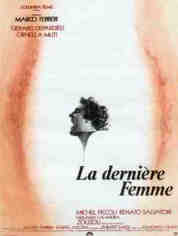
THE LAST WOMAN
France/Italy, 1976, 108 minutes, Colour.
Gerard Depardieu, Ornella Muti, Michel Piccoli, Renato Salvatore, Nathalie Baye.
Directed by Marco Fererri.
The Last Woman is one of several provocative films made by writer-director Marco Fererri. Prior to this film his made La Grande Bouffe, a film about four middle-aged executives deciding to eat themselves to death in the company of prostitutes. This film is a comment on macho society, the image of the male, emasculation of the male as well as questions about the role of masculine and feminine beauty, love, children. It is quite explicit in the nudity of its central characters, in its focus on the human body and private parts, quite explicit in sexual action. To this extent, it was much before its times and may not seem so outrageous as appeared in the mid-70s.
Gerard Depardieu was at the beginning of his long and very successful career, performing with an unselfconscious naturalness in a part that is basically brutish. Ornella Muti, who also had quite a long career, appears as his wife.
1. The impact of the film? Entertainment? Shock? Message?
2. The purpose of the film, for what audience? The perspectives of the director? His questions about the human condition?
3. The blend of reality and unreality? The settings: homes and work, the marital situation, the baby?
4. The colour photography, its style, atmosphere? The musical score?
5. The importance and significance of the dialogue, of talk, especially between Gerard and Valerie? The other men and their approaches?
6. The portrait of Gerard, Gerard Depardieu when young? At work, type, an Everyman? Chauvinist? His relationship with his wife, treatment of her, her treatment of him? The girlfriend, the liaison, sex? Communication? Using women? Attitudes and presuppositions? Self-image and doubt? The fact that he appeared naked through most of the film?
7. Gerard and his child, the child’s presence, the physicality, his own relationship bodily to the child, the child with its mother?
8. The girl, the liaison, Michel and recourse to him? Love or not? The child, ordinary things? Intensity?
9. The portrait of the child, the effect of this behaviour on the child – or not?
10. Michel, his wife as a balance?
11. The clash, the neighbour and sexuality?
12. The demands, the challenges? The graphic nature of the ending? The focus on masculinity, maleness? Real and symbolic?
13. A film like this and the place for fables, questioning basic attitudes, basic stances, especially on masculinity and femininity, sexuality? Values and meaning?